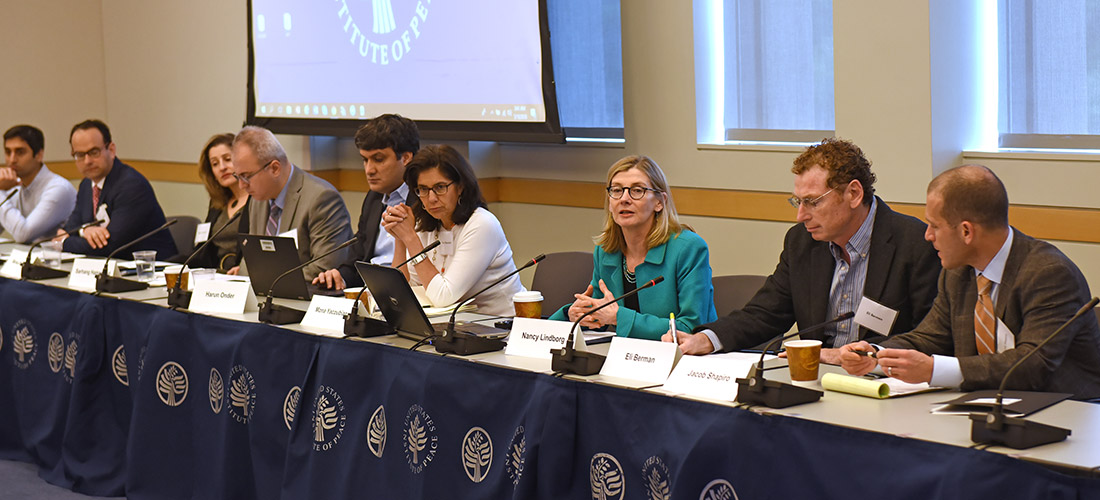The Empirical Studies of Conflict Project (ESOC) held its 8th Annual Meeting on May 10 in Washington, D.C., drawing academics, experts and policymakers from across the world to discuss global conflict.
The conference, which focused on post-conflict stabilization in the Middle East following the decline of the Islamic State of Iraq and Syria (ISIS), featured dozens of academics, policymakers and experts focused on global conflict. The event was co-sponsored by the U.S. Institute of Peace (USIP) and The Pearson Institute for the Study and Resolution of Global Conflicts.
“Our annual meeting brings together scholars and officials from the U.S. government, international organizations, and nongovernmental organizations (NGOs), providing a great opportunity for the next generation of scholars to build connections,” said Jacob N. Shapiro, professor of politics and international affairs at Princeton University's Woodrow Wilson School of Public and International Affairs and director of ESOC.
The ESOC Project compiles and analyzes micro-level conflict data on insurgency, civil war, and politically motivated violence worldwide. The group provides policymakers with research and recommendations on how to respond to security threats.
One of the missions of the annual ESOC conference is to forge relationships and engage those working in research, government and implementing agencies in the discussion of policy options through a series of policy panels and presentations of academic papers.
“There’s a lot of talk in international relations about ‘bridging the gap’ to make our research policy-relevant. ESOC’s model is different. Rather than trying to plug in at senior levels through a well-timed op-ed or precisely stated analogy, we strive to work interactively with governmental and NGOs at all stages of the research process. Our conference takes on a similar approach,” Shapiro said.

Three thematic panels shaped the day’s discussions, focusing on the complexities and constraints of the post-ISIS landscape in the Middle East; new approaches to economic development and humanitarian challenges; and new approaches to the politics of stabilization.
“Like our research efforts, the annual conference brings together academics, policymakers, NGOs and think tanks to discuss issues of shared concern,” said Ethan Kapstein, associate director of ESOC, who also helped to plan the event. “This year’s conference focused on the challenges facing the international community in terms of humanitarian assistance and, eventually, rebuilding a region wracked by violence.”
The day began with a welcome address by Shapiro; Eli Berman, professor and chair of the University of California, San Diego’s Department of Economics; and Nancy Lindborg, president of USIP. Each session was chaired by an ESOC senior researcher and featured conflict experts as panelists.
Peter Quaranto, senior advisor for peace and security at the Office of U.S. Foreign Assistance in the U.S. Department of State, was a panelist on the panel about the politics of stabilization. He shared how ESOC’s research to evaluate stabilization programs in Afghanistan helped to spark and shape an internal review of how the U.S. government approaches stabilization.
“The State Department, USAID, and Department of Defense used ESOC’s work and consulted ESOC’s experts as we synthesized lessons learned and identified a roadmap for maximizing our future work to stabilize conflict-affected areas,” Quaranto explained.
Among the day’s panelists was Melissa Lee, assistant professor of politics and international affairs at the Woodrow Wilson School. In addition to Princeton, USIP and the U.S. Department of State, panelists also hailed from InterAction, the International Rescue Committee, Stanford University, the United Nations, the University of California, San Diego, the U.S. Agency for International Development, and the U.S. Department of Defense.
Outside of the panels, another priority of the conference was to discuss a set of invited academic papers to ensure they meet the high standards of rigor necessary to influence policy and practice. These papers covered a range of conflict-related topics from the long-run consequences of wartime deaths on soldiers’ children, to methods for building trust in post-conflict societies, to a range of new methodological approaches such as using satellite imagery to measure physical destruction in urban areas.
The annual meeting “was particularly gratifying to those of us representing ESOC, as policymakers cited the importance of the work that we do in providing them with powerful, evidence-based messages about the effects of various interventions on conflict stabilization,” concluded Kapstein.
Click here for more information about ESOC.

